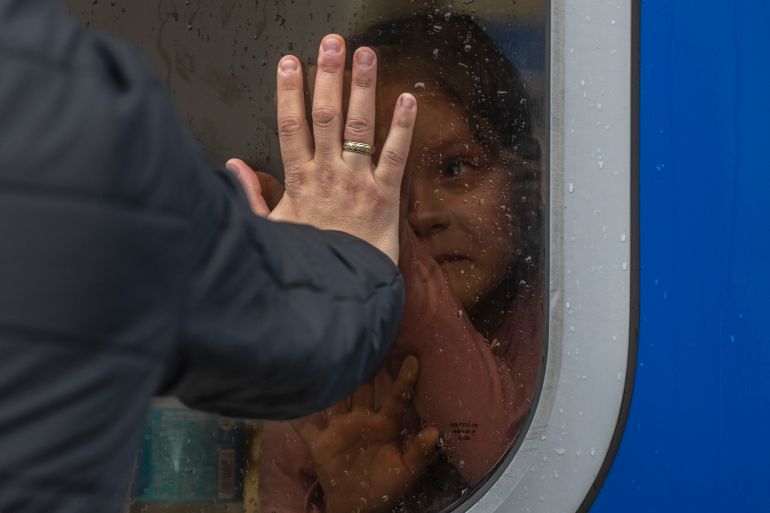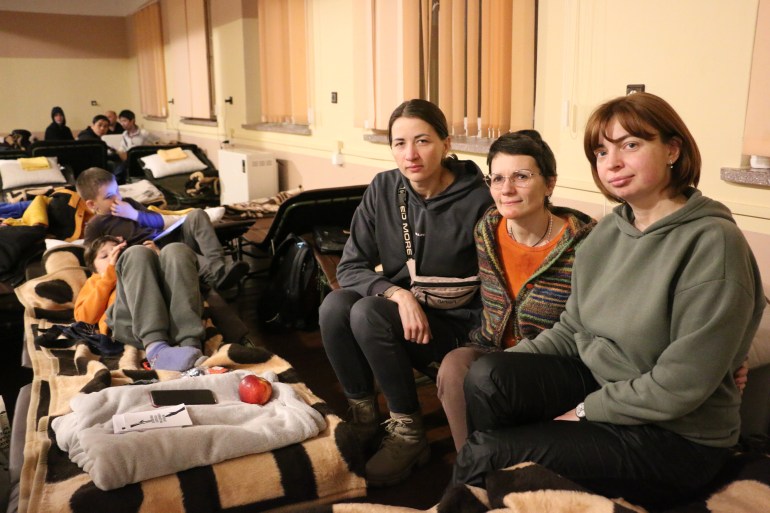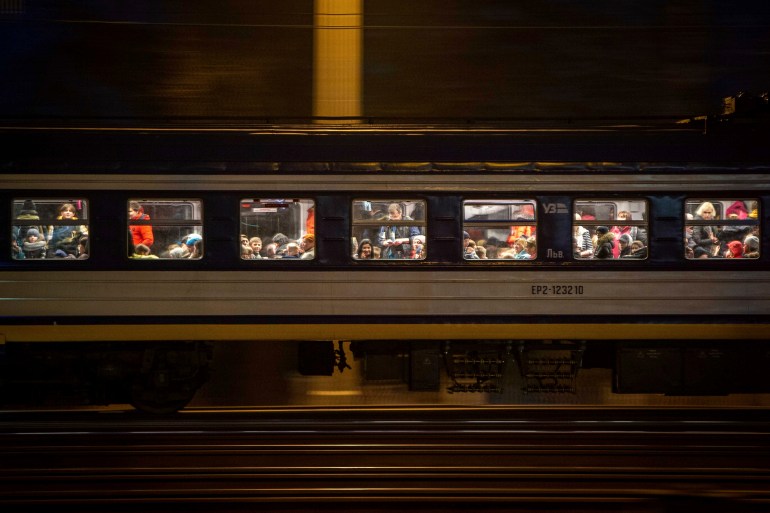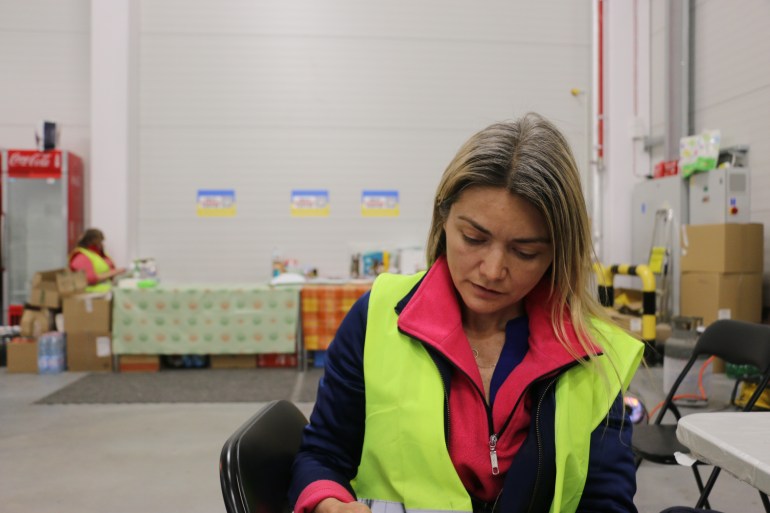‘Only the dead feel no guilt’: Ukrainian refugees on surviving
Survivor’s guilt is a common reaction to war, experts say, as Ukrainian refugees confront feelings of shame.

Lublin, Przemysl and Korczowa, Poland – Sitting on a field bed covered with thick blankets in a small fire station that has been transformed into one of many refugee arrival centres along Poland’s border with Ukraine, Hanna Medvedska takes stock of her escape from Kyiv while the children around her play shooting games.
“I feel ashamed to be here, in this really safe situation, while in Ukraine women have to give birth in bomb shelters,” she tells Al Jazeera.
Keep reading
list of 4 itemsUkraine agriculture minister released on bail in $7m corruption case
Russia-Ukraine war: List of key events, day 792
Risk of military incidents on Belarus-Ukraine border quite high: Lukashenko
Hanna misses her husband who, like other men, was ordered to stay back to defend Ukraine against the Russian invaders.
When she feels tears approaching, she pulls herself together quickly, she doesn’t think she deserves pity. “I shouldn’t make a drama about it,” she says. “If not him, then who?”
Hanna’s words echo through many accounts by Ukrainians who are not facing the direct consequences of the war – or not any more because they managed to flee – they feel guilty, and ashamed. They have survivor’s guilt because they have survived dangers others did not survive, or have not been able to leave Ukraine.
“It often feels strange to refugees that they made it to safety, while others did not,” explains Clemence Due, an associate professor in psychology at the University of Adelaide, who has researched survivor’s guilt among refugees.
War and displacement often trigger survivor’s guilt. It was first discussed after the Holocaust when survivors of the Nazis’ terror regime displayed signs of distress for having escaped a situation their peers had died in.

Shame and guilt are common reactions to traumatic events, including natural disasters or public health crises such as the COVID pandemic or HIV, and they can affect survivors of accidents, genocides, or parents who outlive a child, among others.
While survivor’s guilt can lessen over time, “as long as there is ongoing injustice like in the case of Ukraine, it’s really hard to shake the feeling”, according to Due.
‘Every Ukrainian is experiencing survivor’s guilt’
Karina Harbazei from Kharkiv brought her son to safety in the early days of the war but had to leave her husband behind. She remembers feeling the same.
Before crossing into Poland, she had stayed in a hotel in western Ukraine where all the staff had left, but the owner had decided to stay and serve the internally displaced.
“I was so ashamed to be leaving her behind,” Karina says.
She also cannot forget a group of young women she met on her journey west through Ukraine; they work to raise money to provide supplies for the military and manufacture Molotov cocktails in their free time.
“And I am 35 and I run away,” she says.
“Every Ukrainian alive right now is experiencing survivor’s guilt, to a certain extent,” says Roman Kechur, a Ukrainian psychiatrist and president of the Ukrainian confederation of psychoanalytic therapies.
“The ones who left the country feel guilty toward those who stayed. Those who stayed feel guilty toward those who are in the war-torn east. Those in the east feel guilty toward those who joined the territorial defence forces. Those in the territorial defence forces feel guilty toward the army. And those in the army feel guilty toward those who died,” he says. “Only the dead don’t feel any guilt.”

From an evolutionary perspective, survivor’s guilt is meant to be of benefit to humanity, experts say.
“Groups that are experiencing catastrophe are living through the fear of disintegration. And nothing connects people more than the feeling of guilt,” says Kechur.
‘Why are you not happy?’
The guilt affects not just those who had to run from the violence, it also affects Ukrainians in the diaspora.
A week into the war, Ukraine-born Natasha Korop, who lives in the US, was standing in a checkout line behind a young couple with their baby.
“They were so peaceful … I just felt like something was wrong with this picture,” she says. She started to shake, wondering what was wrong with her, thinking: “I can’t be expecting bombing around me, I can’t be expecting crying around me. I am not in Ukraine!”
Like many others, it is hard for her to put the complex set of emotions she is feeling into words.
“It’s like a quilt of emotions. All I really know is: I am trapped in this feeling and I can’t shake it off.” Adding to the frustration is the helplessness that accompanies the guilt.
A thought that came to Natasha often was “I should be in Ukraine right now,” and if not for her young children, she would have gone, she says.
Instead, she flew to Poland to volunteer at a warehouse run by Help Ukraine Center, an organisation that collects and distributes humanitarian aid to Ukraine. It has helped her cope with her feelings of guilt.

Natasha was already familiar with the concept of survivor’s guilt, having heard about someone suffering from it in the media, “but I didn’t really get it,” she says. She recalls thinking: “Why are you not happy?” Now, she understands.
‘I wish I had done more’
Against the backdrop of increasing numbers of displaced people in the world, experts argue that survivor’s guilt should get much more attention. “Knowing that there’s a name to it and that other people share the feeling really helps those affected,” Due says.
But it is a vicious circle. Because survivor’s guilt is linked to shame, those affected often don’t share their thoughts and feelings.
“It’s never something I overtly say: I feel guilt,” says Dina Nayeri, an Iranian-American writer who fled from religious persecution in Isfahan with her mother and brother when she was a child.
“There’s this underlying feeling of: I am one of the lucky ones. And I have to make good.”
This feeling of having to make good is often reflected by the societies hosting refugees. But for Nayeri, author of the book, The Ungrateful Refugee, refugees have no debt to repay to anyone.
“I feel enraged when people who were born lucky expect me to show them gratitude for my rescue,” she says.
George Nurmanov is a volunteer coordinator at a shopping mall in Przemysl converted into a refugee hub. Like the Ukrainians he helps, the Russian had to leave his homeland behind because of Vladimir Putin. Ten years ago he moved to Poland when his activism against Russia’s system became too dangerous.
George started helping refugees on the first day of the invasion in February but, because he was driving a car with Russian plates that a relative recently left with him, Ukrainians cursed him, he says. He has kept the car at home since then.
As a Russian, he feels his own guilt. But he does not believe it is guilt; instead he thinks he carries responsibility for Russia’s actions in Ukraine. “I don’t support what Putin is doing. That’s why I am here, trying to do my best.” He does not think that he could have changed what happened but laments, “I still wish I had done more.”